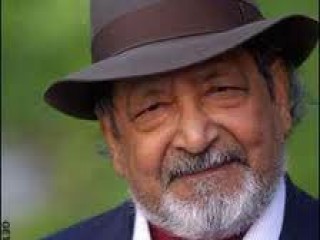
V.S. Naipaul biography
Date of birth : 1932-08-17
Date of death : -
Birthplace : Chaguanas, Trinidad
Nationality : Trinidadian
Category : Famous Figures
Last modified : 2011-09-22
Credited as : realism novelist, Nobel Prize for Literature,
1 votes so far
Descended from Hindu Indians who had immigrated to Trinidad as indentured servants, Naipaul left Trinidad to attend the University of Oxford in 1950. He subsequently settled in England, although he traveled extensively thereafter. His earliest books (The Mystic Masseur, 1957; The Suffrage of Elvira, 1958; and Miguel Street, 1959) are ironic and satirical accounts of life in the Caribbean. His fourth novel, A House for Mr. Biswas (1961), also set in Trinidad, was a much more important work and won him major recognition. It centres on the main character's attempt to assert his personal identity and establish his independence as symbolized by owning his own house. Naipaul's subsequent novels used other national settings but continued to explore the personal and collective alienation experienced in new nations that were struggling to integrate their native and Western-colonial heritages. The three stories in In a Free State (1971), which won Britain's Booker Prize, are set in various countries; Guerrillas (1975) is a despairing look at an abortive uprising on a Caribbean island; and A Bend in the River (1979) pessimistically examines the uncertain future of a newly independent state in Central Africa. A Way in the World (1994) is an essaylike novel examining how history forms individuals' characters. Naipaul's other novels include The Mimic Men (1967) and The Enigma of Arrival (1987).
Among Naipaul's nonfiction works are three studies of India, An Area of Darkness (1965), India: A Wounded Civilization (1977), and India: A Million Mutinies Now (1990); The Five Societies-British, French, and Dutch-in the West Indies (1963); and Among the Believers: An Islamic Journey (1981). Naipaul was knighted in 1989.
In 1998 he published Beyond Belief: Islamic Excursions Among the Converted Peoples, a portrayal of the Islamic faith in the lives of ordinary people in Iran, Pakistan, Indonesia, and Malaysia. Half a Life (2001) is a novel about an Indian immigrant to England and then Africa. He becomes "half a person," as Naipaul has said, "living a borrowed life." Released the year that Naipaul received the Nobel Prize, Half a Life was considered by many critics to illustrate beautifully the reasons that he won the prize. Subsequent works include The Writer and the World (2002) and Literary Occasions (2003), both collections of previously published essays. The novel Magic Seeds (2004) is a sequel to Half a Life.
Awards:
Man Booker Prize 1971 for In a Free State
Nobel Prize for Literature 2001
Knighthood 1990
















